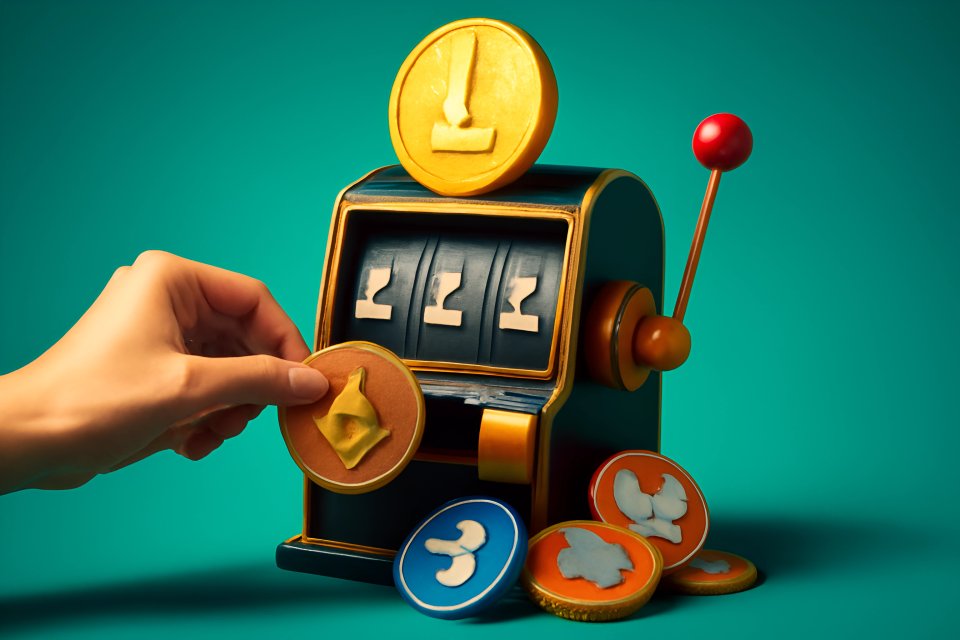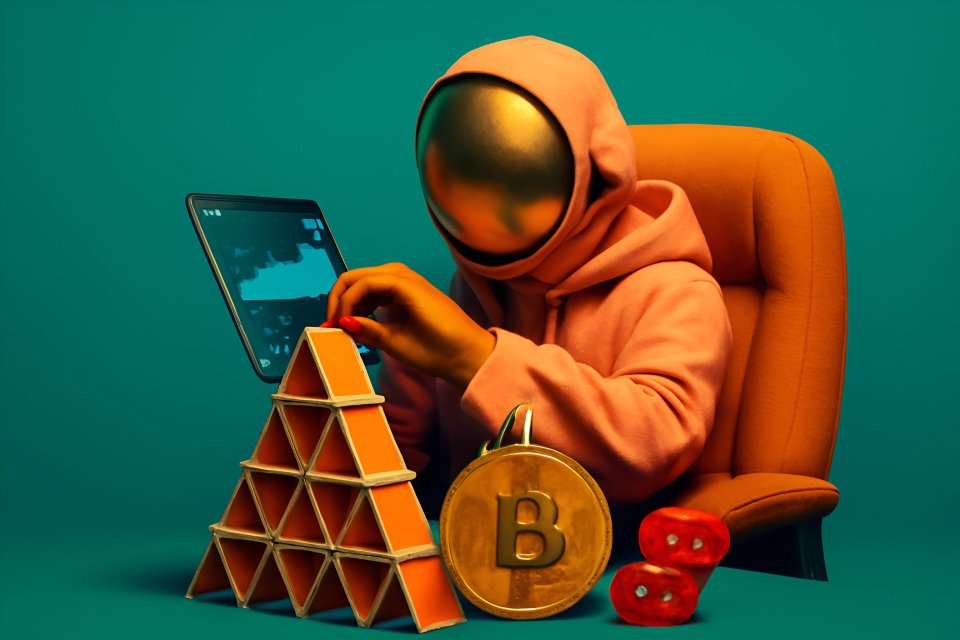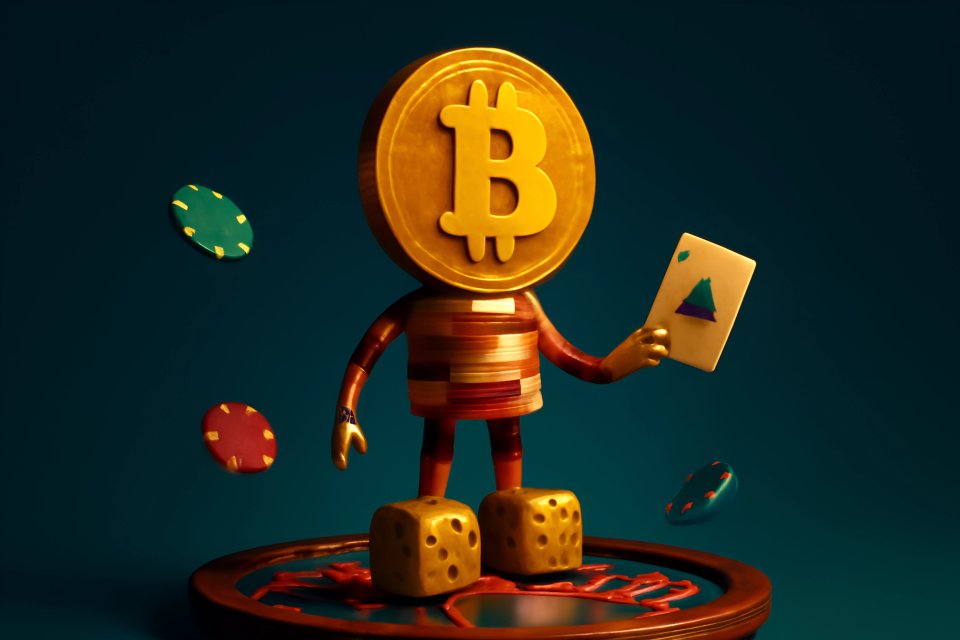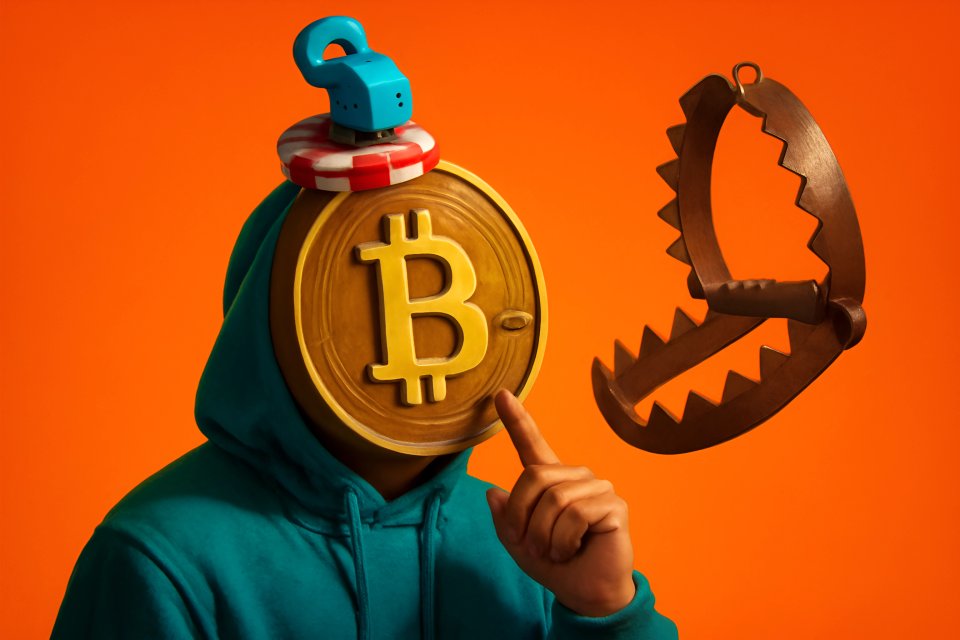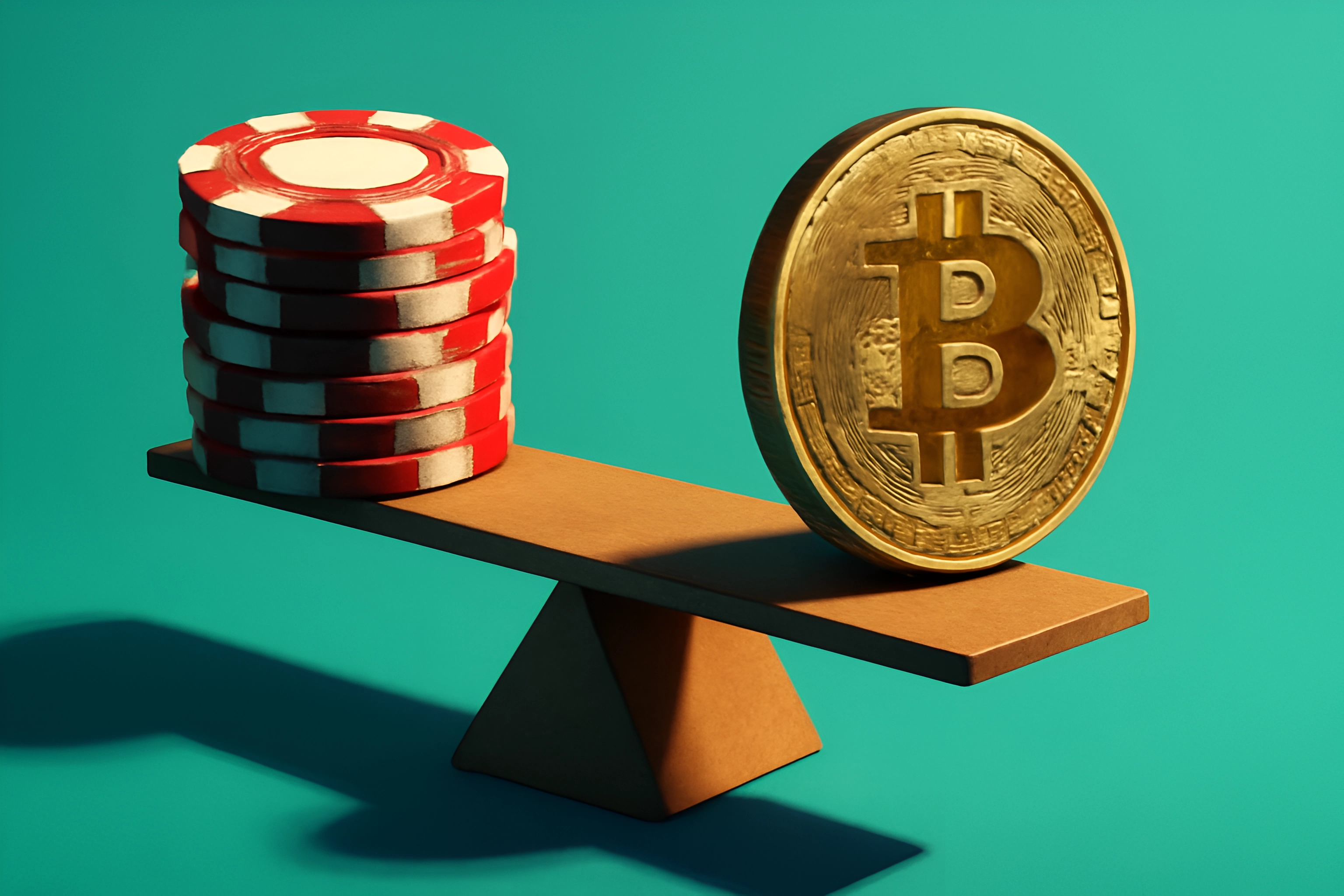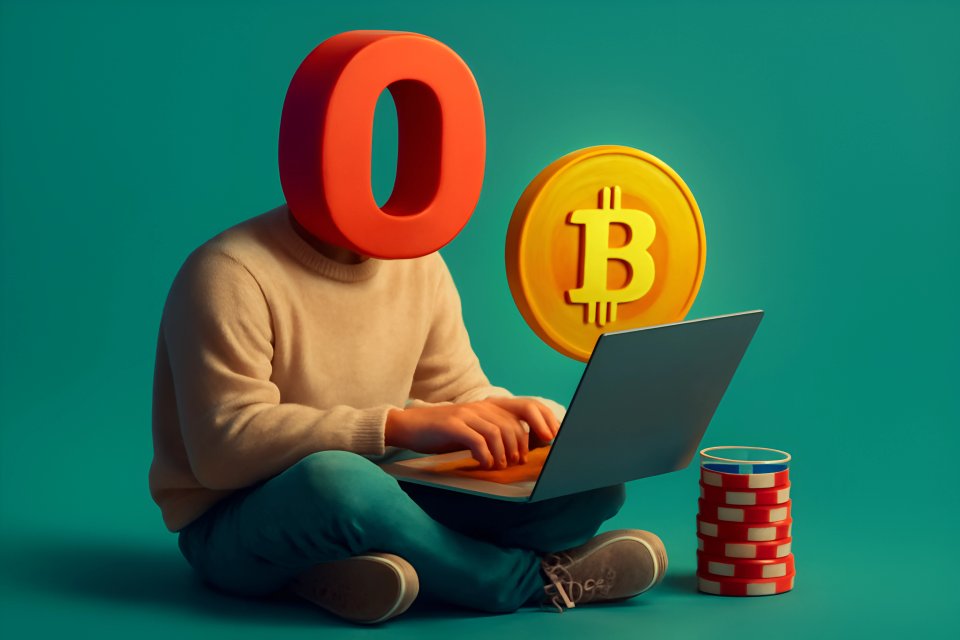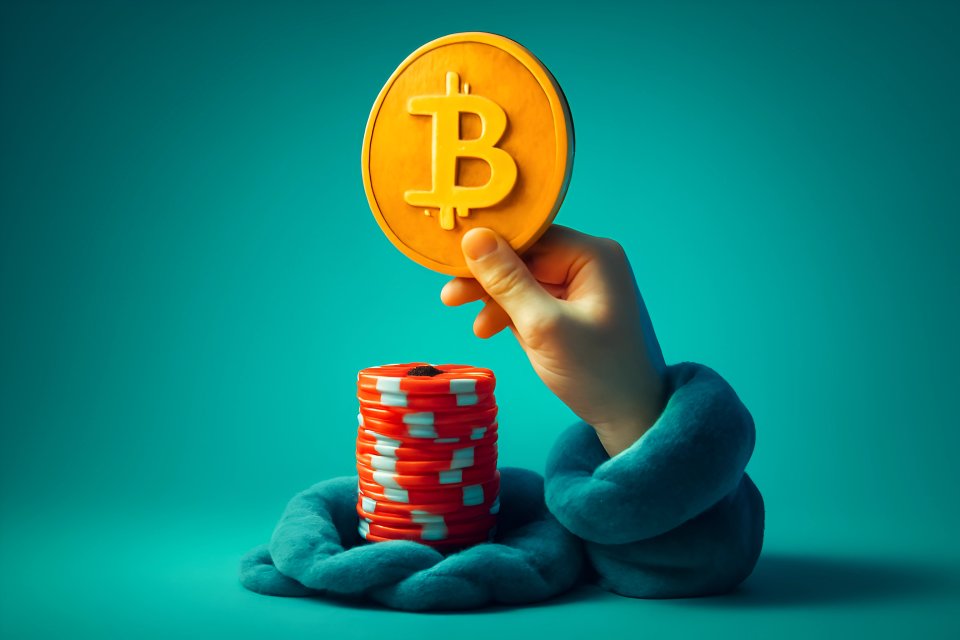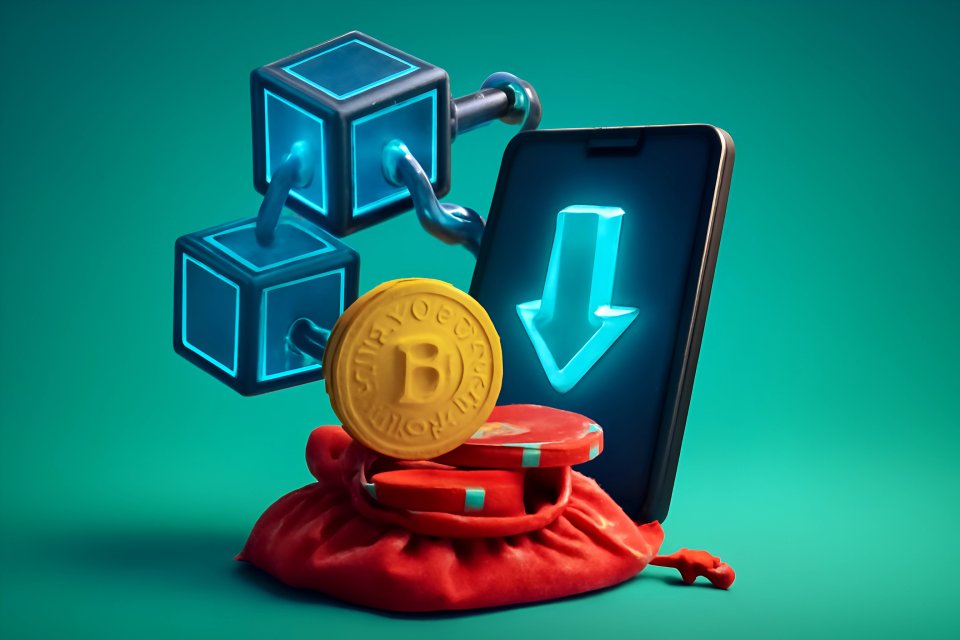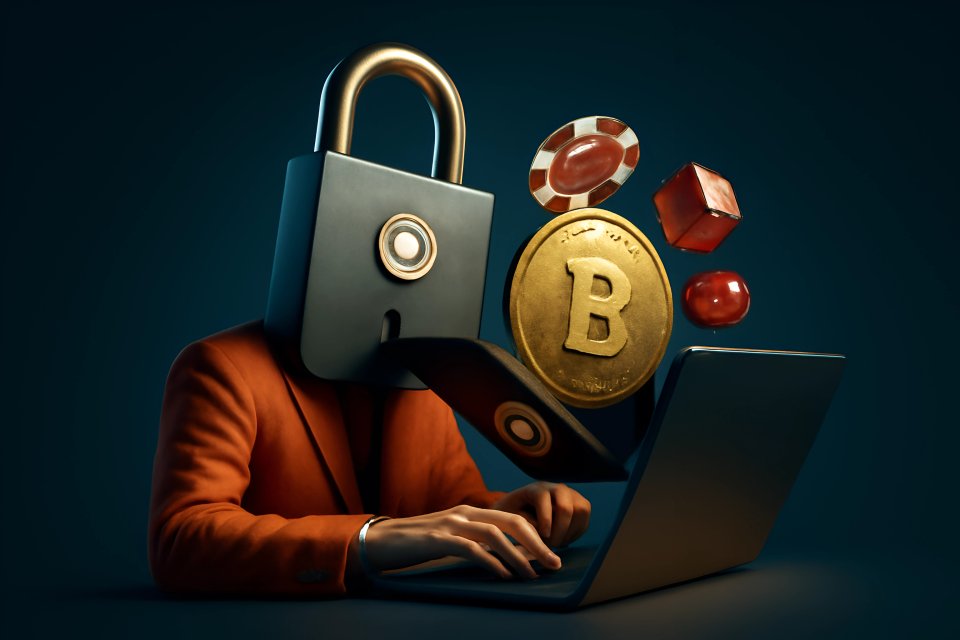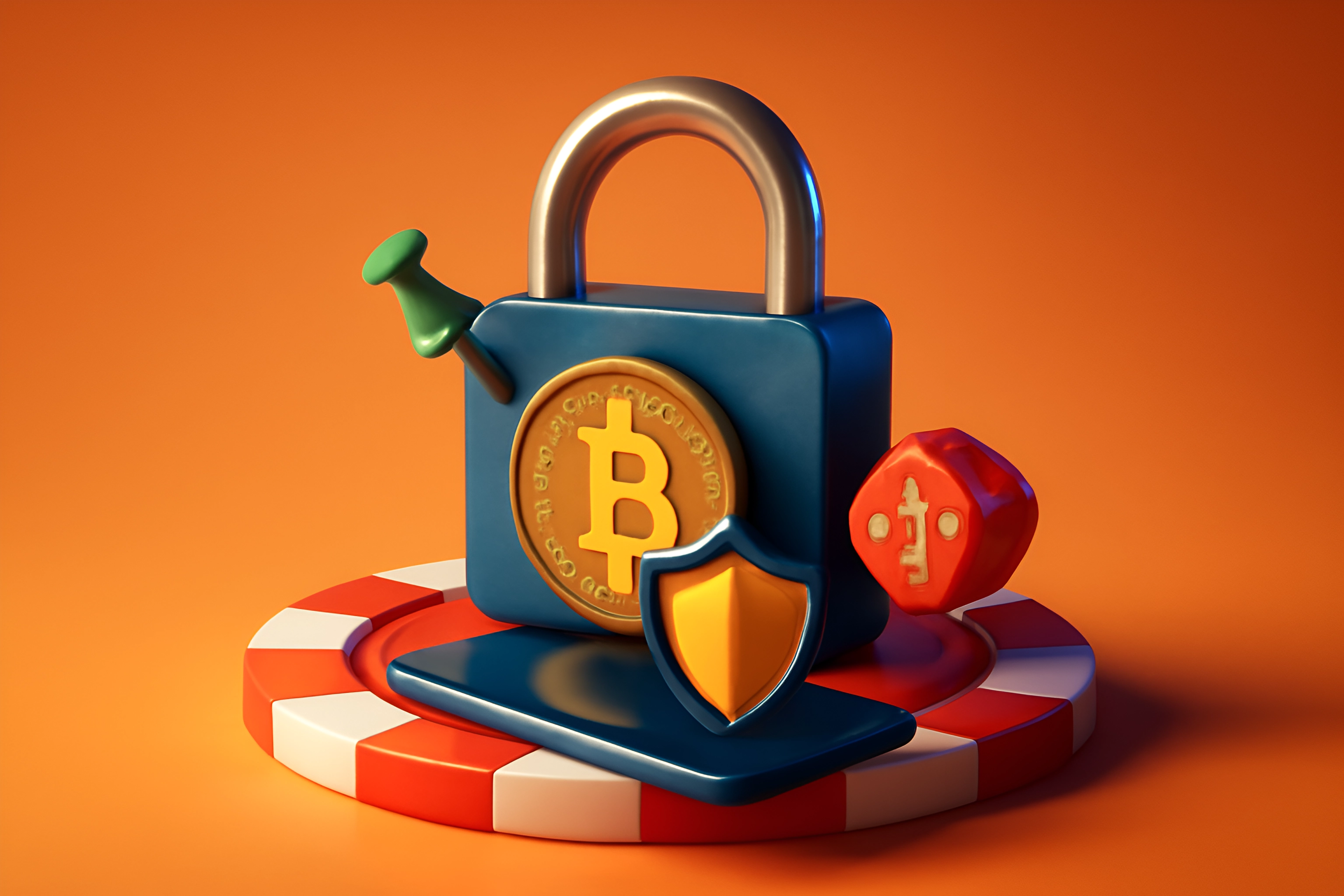
Introduction: Your First Bet – Securing Your Crypto
Feel that electric buzz? The dazzling lights of the crypto casino, the siren song of the next monumental win... But hold on a moment! Before you dive headfirst into that thrilling digital world and place your first bet, have you truly fortified your treasure chest? Are your hard-earned digital assets locked down tighter than a drum?
Imagine the scene: you’ve just hit that life-altering jackpot, your screen erupts with the glorious sight of cascading winnings... only to discover your crypto wallet has been ransacked, picked clean by digital bandits. It’s the ultimate gut-wrenching nightmare, akin to leaving a towering stack of casino chips completely unattended on a crowded casino floor. This isn't just a game of chance; it's a battle for your digital survival.
But banish those fears, aspiring crypto whale! This isn't some sleep-inducing technical manual you're about to endure. No, this is your personal, actionable blueprint to constructing an impenetrable digital fortress, your golden key to unlocking serene, worry-free crypto casino gaming. We're here to guide you every step of the way, ensuring your focus remains on the thrill of the game, not the dread of loss.
In this comprehensive guide, we'll embark on a crucial journey. We will meticulously explore how to select the ideal digital vault for your precious coins, provide a step-by-step walkthrough for a truly bulletproof setup, unveil the casino-specific security rituals that seasoned professionals swear by, and crucially, expose the treacherous traps and pitfalls that frequently ensnare unwary players. At Crypto Casino Sharks, our mission extends beyond just the excitement of the wager; we are passionately committed to empowering you to play intelligently, engage fairly, and above all, operate with fundamental, unwavering security. Your peace of mind isn't just a byproduct; it's our paramount objective.
Understanding Crypto Wallets: The Basics for Casino Players
So, you're ready to jump into the exhilarating world of crypto casinos, but first, let's talk about your most essential tool: the crypto wallet. Understanding its function is the bedrock of your security and your key to confident gaming. Without this knowledge, you're navigating a minefield blindfolded.
What is a Crypto Wallet?
Think of your crypto wallet not just as a digital purse, but as your personal, ultra-secure digital bank vault, far more robust and private than any traditional leather billfold you've ever owned. It's the sacred space where you hold the cryptographic keys that prove ownership of your digital assets on the blockchain. According to Coinbase, a crypto wallet is a tool that allows you to interact with a blockchain network, managing these vital keys.
Now, let's demystify "keys." Your public key functions much like your unique casino account number or your email address – it’s the identifier you can safely share with a crypto casino so they know precisely where to send your glorious winnings. However, your private key... ah, that is the master key to the entire vault, the digital signature that authorizes any movement of your funds. Guard this private key with an almost religious fervor, because if anyone else gets their hands on it, they effectively own your crypto. This distinction, as Investopedia explains regarding Bitcoin wallets, is crucial: wallets don't store coins themselves, but the keys that control them.
Types of Crypto Wallets (Pros & Cons for Casino Gaming)
Not all crypto wallets are created equal, especially when it comes to the fast-paced, high-stakes environment of online casino gaming. They generally fall into two main categories: hot wallets (online) and cold wallets (offline). Each has its distinct advantages and disadvantages for the discerning casino player.
Hot Wallets (Online, Connected to the Internet)
Are you geared up for immediate action and rapid-fire play? Hot wallets are your frontline soldiers, constantly connected to the internet, making them incredibly convenient for those frequent deposits and withdrawals that keep the casino excitement flowing. They are designed for ease of use and quick access.
-
Software Wallets (Desktop, Mobile):
These are applications you install on your computer or smartphone.
Dreaming of lightning-fast transactions to catch that hot streak? Check. Craving a user-friendly interface that doesn’t require a degree in computer science? Absolutely. Software wallets like Exodus or Trust Wallet are often lauded for their convenience, making them perfect when you're deep in the gaming zone and want to keep those reels spinning or cards dealing without a hitch.
But here lies the crucial trade-off: their constant online presence inherently makes them a more attractive and accessible target for sophisticated digital pickpockets and malware if your device or practices aren't up to snuff. As highlighted in Trust Wallet's comprehensive security overview, while they implement robust security measures, user vigilance remains paramount.
From a casino gaming perspective, these wallets are ideal for managing your 'active play' funds – the crypto you've allocated for your current gaming session. Think of it as your readily accessible "table money," ready to be deployed at a moment's notice.
-
Web/Browser Extension Wallets (e.g., MetaMask):
These wallets operate as extensions for your web browser, interacting directly with web-based platforms.
Want the most seamless, integrated experience with those cutting-edge decentralized finance (DeFi) casinos or blockchain-native games? Browser extension wallets, with
MetaMaskbeing a prime example, are often your best companions. They are specifically designed to make interacting with web3 applications, including many crypto casinos, an absolute breeze, with MetaMask's SDK even enabling features like one-click deposits directly from mobile browsers to casino dApps.However, this unparalleled convenience comes with its own specific caveat: your web browser itself can become a potential gateway for security threats if compromised. Vulnerabilities within the browser or malicious browser extensions could potentially put your funds at risk if you're not diligent.
For the casino enthusiast, these wallets are incredibly popular for a very good reason – they get you into the heart of the action quickly and efficiently. But treat them with the respect they demand: ensure your browser is always updated, use minimal other extensions, and double-down on your overall browser security hygiene.
Cold Wallets (Offline)
Did you just hit a monumental, screen-shattering jackpot? Or perhaps you're a strategic player, preferring to HODL your substantial casino bankroll like a mythical digital dragon fiercely guarding its glittering hoard? For these scenarios, cold wallets are your impenetrable, offline fortress, offering the pinnacle of security.
-
Hardware Wallets (e.g., Ledger, Trezor):
These are physical devices that store your private keys offline.
This is the Fort Knox, the digital Swiss bank account for your cryptocurrency. With a hardware wallet, such as those from Ledger, which boasts military-grade Secure Element chips, or Trezor, known for its transparent open-source firmware, your private keys never, ever touch the internet or your potentially compromised computer. This makes them virtually immune to online hacking attempts, malware, and phishing attacks.
The trade-off for this Fort Knox-level security is a slight reduction in convenience for frequent, small transactions. Think of it as the process of moving funds from your main, ultra-secure bank vault into your readily accessible pocket money; it takes an extra step or two.
From a casino player's standpoint, hardware wallets are the undisputed, heavyweight champions for stashing those significant winnings or safeguarding the bulk of your crypto bankroll that isn't currently in active play. Keep your serious, life-impacting money here, sleeping soundly and securely.
-
Paper Wallets:
A paper wallet is essentially a physical document on which your public and private keys are printed.
Truly offline, a paper wallet can indeed offer a high degree of security, if you understand precisely what you're doing during its creation and storage. It's literally your keys, your access to your crypto, printed out on a piece of paper.
But consider the inherent physical vulnerabilities: what if your dog decides it looks like a tasty chew toy? What if the ink fades into illegibility over time, or worse, it's destroyed in a fire or flood? They are also notoriously clunky and impractical for actually using your crypto at an online casino, requiring complex steps to import keys.
For the casino gamer, while it's an option some ultra-paranoid individuals might consider for deep, long-term storage of assets they don't plan to touch for years, it's generally not a practical primary solution for the dynamic and interactive world of crypto casino gaming.
Why Not Just Use an Exchange Wallet for Casinos?
Are you feeling the magnetic pull of convenience, tempted to simply use the wallet provided by your cryptocurrency exchange (like Coinbase or Binance) for all your casino play? Hold your horses, gambler! That seemingly easy path could lead you straight into a costly ambush, and here’s why you must resist.
Firstly, and most critically, when you leave your crypto on an exchange, you don't truly, unequivocally control your private keys. The exchange holds them for you. And what's the immutable golden rule of crypto? "Not your keys, not your coins," a phrase famously championed by Andreas Antonopoulos, meaning if you don't hold the keys, you don't truly own the crypto. This custodial arrangement means you're trusting a third party with the ultimate access to your funds.
Secondly, many cryptocurrency exchanges operate under very strict terms of service and regulatory frameworks. If they detect transactions that they deem related to online gambling – which can vary wildly by jurisdiction and their internal policies – they possess the power to freeze your account and, consequently, all the funds within it. Imagine the sheer agony of hitting a massive win, only to find your winnings locked up, tantalizingly out of reach due to an exchange's policy decision! Furthermore, centralized exchanges are honeypots for hackers; a staggering over $1 billion was stolen from them in 2023 alone, underscoring their vulnerability as centralized points of failure.
Our unwavering Crypto Casino Sharks recommendation is crystal clear: for genuine peace of mind, absolute control over your assets, and to sidestep potential interference, always and without exception use a personal, non-custodial wallet for all your crypto casino adventures. It’s your money, your crypto, and it should unequivocally be under your rules and your control. This is non-negotiable for secure casino gaming.
Choosing the Right Crypto Wallet for Your Casino Adventures
Alright, you understand the "what" and "why" of crypto wallets. Now, how do you pinpoint the perfect digital champion for your casino escapades? This isn't merely about selecting software with a flashy interface or a cool name; it's about choosing an impenetrable defense system for your valuable assets.
Key Factors to Consider
When you're evaluating potential wallets, it's like scouting a personal bodyguard for your crypto – you need to be thorough and demanding. First and foremost, scrutinize its security features: does it offer robust two-factor authentication (2FA), demand strong PIN codes, or even incorporate biometric authentication like fingerprint or facial recognition? Next, ensure it provides broad supported cryptocurrencies, covering all the coins you intend to wield at your favorite crypto casinos – Bitcoin (BTC), Ethereum (ETH), Litecoin (LTC), Tether (USDT), and others are often essential. The Trust Wallet security model, for instance, claims to prevent 98% of unauthorized access attempts in simulated attacks, a testament to the power of layered security features.
Then, consider its ease of use, especially if you're relatively new to the crypto gaming arena; a complicated wallet can lead to costly mistakes. What is its reputation and reviews within the crypto community? Seek out well-established, trusted wallet providers with a proven track record of security and reliability. Critically, investigate its backup and recovery options; a robust, user-friendly seed phrase (or recovery phrase) mechanism is absolutely non-negotiable for safeguarding against loss. Some wallets, like those built with hierarchical deterministic (HD) architecture, can enhance your privacy by automatically generating new receiving addresses for each transaction, making it harder to link all your casino activity.
Finally, while not always essential, cross-platform compatibility can be a significant boon. The ability to securely access and manage your casino wallet on both your desktop computer for those focused gaming sessions and your mobile device for convenient play on the go offers valuable flexibility. Does the wallet developer engage in transparent practices, such as publishing open-source code audits like Trezor does for its firmware? This allows the wider security community to scrutinize the code for potential vulnerabilities, adding an extra layer of trust.
Our Top Wallet Type Recommendations for Casino Gaming
Feeling a bit dizzy from the sheer array of choices and technical jargon? Let's cut straight through the noise and offer some clear, actionable recommendations tailored for the crypto casino player. For your day-to-day, active casino play – those crucial deposits that get you into the game and those thrilling withdrawals when you win – a dedicated, reputable software wallet, whether it's a mobile app or a desktop application, is generally your most effective workhorse. It strikes the optimal balance between robust security for your active funds and the convenience needed for seamless gaming.
But what about those truly life-altering jackpots, the kind that make your heart pound and your future look a whole lot brighter? Or what about the substantial, carefully accumulated crypto bankroll you're strategically building for the long haul? For these high-value assets, nothing in the digital world beats the ironclad security of a hardware wallet. Think of it as your personal, offline Swiss bank account specifically for your cryptocurrency, keeping your most significant winnings and savings far, far away from the prying eyes and malicious grasp of online threats.
This strategic, two-wallet approach is a cornerstone of sophisticated crypto asset protection: one wallet for the dynamic battlefield of active play (your software wallet) and another, more fortified one for the secure treasury where you store your accumulated wealth (your hardware wallet). This practice of segregating funds is not just a suggestion; it's a fundamental principle of smart crypto risk management, as highlighted by financial experts, and it's absolutely crucial for any serious crypto casino player.
Step-by-Step: Setting Up Your Crypto Wallet Securely
You're armed with knowledge, you've chosen your wallet type – now it's time for the crucial setup phase. This is where diligence pays dividends, transforming a piece of software into your personal digital fortress. Follow these steps meticulously.
Download from Official Sources ONLY
This point cannot be stressed enough; it is absolutely CRITICAL to your financial safety. Do you want to unwittingly hand over your precious crypto to opportunistic scammers on a gleaming silver platter? Then, by all means, go ahead and click on that suspicious, unsolicited link you received in a random email or a dubious forum post. For everyone else who values their assets: you must ONLY download wallet software directly from the official websites of the wallet developers or from verified, official app stores (like the Google Play Store or Apple App Store, ensuring the publisher is legitimate). Phishing websites and counterfeit apps are rampant, designed to look identical to the real thing, and according to Crystal Intelligence, a shocking 78% of counterfeit crypto wallets originate from unofficial sources and third-party app stores.
For instance, if you're opting for MetaMask, ensure you are navigating directly to metamask.io or its official page within the Chrome Web Store. For Ledger hardware wallets, your source should be ledger.com for the Ledger Live software. For Trust Wallet, go to trustwallet.com or their official GitHub repository for direct APK/IPA files if you're an advanced user. Double-check the website URL in your browser's address bar. Triple-check it. Look for subtle misspellings or unusual domain extensions. Your entire financial future in the crypto space could hinge on this simple act of verification.
Here's a pro tip for the extra cautious, and in crypto, there's no such thing as too careful: some security experts even advocate for disconnecting your computer from the internet during the actual software installation process. This can help prevent any potential "drive-by" malware injections or last-minute interference from malicious actors during the setup. It might sound a tad extreme to newcomers, but when you're safeguarding potentially significant sums of digital currency, every layer of precaution is a wise investment. As CoinDesk advises in their beginner guides, starting with legitimate software is the first and most crucial step.
Installation & Wallet Creation
Alright, you've successfully and safely downloaded the legitimate wallet software from an official source. Have you fired it up? Excellent. The wallet creation process itself is generally designed to be intuitive and straightforward, even for those new to the crypto world. You'll typically be greeted with prominent options like "Create a New Wallet" or "Get Started."
Your task now is to follow the on-screen instructions with precision and attentiveness. This is absolutely not the time to rush through steps, mindlessly clicking "Next" or "Continue" without thoroughly reading and understanding each prompt. The software is meticulously guiding you through the creation of your unique digital identity on the blockchain, a process that involves generating your critical private and public keys.
Pay extremely close attention to any security advice, warnings, or best practices that the wallet software itself provides during this setup phase. These aren't just casual suggestions or optional extras; they are often vital, non-negotiable steps designed to protect your future assets from a multitude of potential threats. Heed them as if they were direct instructions from your most trusted financial advisor.
THE GOLDEN RULE: Securing Your Seed Phrase (Recovery Phrase)
Now, lean in and listen very carefully, because this is arguably the single most important secret I will share with you in this entire guide. Your seed phrase – also commonly referred to as a recovery phrase, mnemonic phrase, or backup phrase – is EVERYTHING. It is the absolute master key to your cryptocurrency. This phrase typically consists of 12 or 24 randomly generated words. If you lose this seed phrase, or if someone else gains access to it, you effectively lose permanent access to your crypto. There are no appeals, no customer service hotlines to call for a reset, no "forgot my seed phrase" button. As the stark warning from CoinDesk on seed phrases goes, "Anyone with these words controls your assets permanently."
So, what are the non-negotiable DOs? You MUST write it down physically. Use a reliable pen. On actual paper. Better yet, create multiple copies of this handwritten phrase. Store these physical copies in different, geographically separate, highly secure, offline locations. Think about options like a fireproof and waterproof safe in your home, perhaps another copy stored in a different secure location known only to you, or even a bank security deposit box. For ultimate durability against physical threats like fire or water damage, consider investing in specialized solutions like engraving your seed phrase onto titanium plates. And critically, once you've written it down, verify your backup meticulously – most wallet software will have a step where you re-enter the words to confirm accuracy. Do not skip this verification step!
And what are the absolute, under-any-circumstances DON'Ts? NEVER, EVER take a screenshot of your seed phrase. NEVER store it in a digital text file on your computer, smartphone, or any digital device. NEVER email it to yourself or anyone else. NEVER save it in any cloud storage service like Google Drive, Dropbox, or iCloud. And it should go without saying, but NEVER, EVER, EVER share your seed phrase with ANYONE. No legitimate representative from Crypto Casino Sharks, no casino support agent, no wallet developer will EVER ask you for your seed phrase. If someone, anyone, asks for your seed phrase, they are unequivocally trying to ROB YOU. Treat it as the ultimate secret. Ledger emphasizes the offline nature of seed phrase storage as a cornerstone of hardware wallet security.
Setting a Strong, Unique Password/PIN for the Wallet App
Your meticulously secured seed phrase is your ultimate lifeline, primarily for disaster recovery scenarios like a lost or damaged device. For the everyday, routine access to your wallet application on your computer or mobile phone, you will typically set a password or a PIN code. Do not get lazy or complacent at this stage; this is your first active line of defense.
Ensure this password or PIN is exceptionally strong. For passwords, this means a lengthy combination of uppercase and lowercase letters, numbers, and special symbols (e.g., !, @, #, $). The longer and more complex, the better. Crucially, make it unique – do not ever reuse passwords from your email account, social media profiles, or any other online service. If one account is compromised, reusing passwords means all your accounts become vulnerable. This password specifically protects the wallet software from unauthorized access on that particular device.
Consider using a reputable password manager application to help you generate and securely store these complex, unique passwords. However, remember that the master password for your password manager itself must then be incredibly robust, memorable only to you, and ideally backed up just as securely as a seed phrase. This password acts as the gatekeeper to your active casino wallet.
Enabling Two-Factor Authentication (2FA/MFA) if Available
If your chosen crypto wallet software offers the option for Two-Factor Authentication (2FA) or Multi-Factor Authentication (MFA), you should enable it. Not tomorrow, not next week, but right now, or as soon as you've completed the initial setup. This adds another critical, powerful layer of security to your digital fortress, making it significantly harder for unauthorized individuals to access your funds.
Typically, 2FA involves using an authenticator application on your smartphone (popular choices include Google Authenticator, Authy, or Microsoft Authenticator) that generates a unique, time-sensitive numerical code. To log in or authorize transactions, you'll need to provide both your regular password and this constantly changing code from your authenticator app. This means that even if a determined hacker somehow manages to obtain or guess your password, they still wouldn't be able to access your wallet without also having physical access to your 2FA device (usually your phone).
For an even higher level of 2FA security, especially when dealing with substantial amounts of crypto for casino gaming or storing significant winnings, consider investing in hardware security keys like a YubiKey. These physical keys provide cryptographic proof of your identity, are resistant to phishing, and are widely considered one of the most secure forms of 2FA. It's a relatively small financial investment for a massive upgrade in your security posture. Trust Wallet, for example, supports various authentication methods to bolster account protection.
Initial Funding & Test Transaction
Congratulations! Your digital fortress is now constructed, secured with a strong password, and ideally, fortified with 2FA. Now, how do you get your cryptocurrency into it and ready for action at the casino tables? The first step is to locate your wallet address for the specific cryptocurrency you intend to deposit (e.g., Bitcoin, Ethereum). This address is a long, unique string of alphanumeric characters; think of it as your personal bank account number for that particular crypto. You'll find it within your wallet app, usually under a "Receive" or "Deposit" section.
Now, before you get excited and transfer your entire crypto bankroll in one go, ALWAYS, without fail, perform a small test transaction first. This is a crucial step that many impatient users skip, often to their later regret. Send the absolute minimum possible amount of crypto from your exchange account (or wherever you're sending it from) to your newly set up wallet address. Patiently wait for it to arrive and be confirmed in your wallet. Then, if you're feeling thorough, try sending an equally tiny amount from your new wallet back to the exchange, or perhaps to the casino if you're ready to make a small initial deposit.
Why go through this seemingly tedious rigmarole for a tiny amount? This simple test serves multiple vital purposes. Firstly, it confirms that you've correctly copied the address and that everything is functioning as expected. Secondly, and perhaps most importantly, it helps you detect the presence of insidious clipboard malware or "clippers." This nasty type of malicious software can secretly monitor your computer's clipboard and, when it detects a copied crypto address, surreptitiously replace it with a thief's address. If you don't verify, you could unknowingly send your funds directly to a scammer. OSL Academy specifically warns about the dangers of clipboard hijacking malware and how these test transactions can save you from disaster.
Essential Security Practices for Crypto Casino Gaming
Setting up your wallet securely is a massive first step, but the vigilance doesn't end there. Ongoing security practices are vital, especially when you're actively engaging with crypto casinos. Think of these as your daily rituals to keep the digital wolves from your door.
The "Casino Wallet" Strategy: Segregation of Funds
Want to truly play like a seasoned crypto casino professional? Then you need to adopt their mindset regarding fund management. Never, ever dump your entire crypto life savings, your long-term investments, or funds earmarked for other purposes into the single wallet you use for daily casino play. That's like walking into a casino with your entire net worth in your pocket – it's simply asking for trouble. Instead, you must employ the Casino Wallet Strategy, a powerful form of financial compartmentalization.
This strategy involves setting up and using a dedicated wallet that is utilized exclusively for your casino deposits and withdrawals. This wallet becomes your 'gaming float' or your 'operational account' for casino activities. Keep only the amount of crypto that you are comfortable risking in a single session or over a short period in this specific wallet. This dramatically limits your potential losses if this active wallet is ever compromised for any reason.
Your main crypto holdings, your cherished long-term investments, what we like to call your 'digital crown jewels' – these must stay securely locked away in a completely separate, more robustly secured wallet, preferably a hardware wallet that remains offline most of the time. Financial experts, like those at Investopedia, consistently highlight the inherent risks of storing large crypto balances in a single, frequently used wallet, and this warning is doubly true for wallets actively interacting with online casino platforms. This segregation is a cornerstone of responsible crypto gambling.
Regularly Transfer Winnings
Did you just hit a particularly nice win, or perhaps a series of smaller wins have accumulated into a tidy sum? Congratulations! That feeling is what crypto gaming is all about. But now, don't let that newly acquired digital cash burn an unnecessary hole in your active hot wallet. Make it an unbreakable habit to regularly transfer significant winnings out of your primary casino wallet.
Promptly move those profits from your 'hot' casino wallet to your more secure cold storage solution (that hardware wallet we keep emphasizing is perfect for this) or, at the very least, to a separate software wallet that isn't directly and frequently interacting with online casino platforms. The longer substantial sums of cryptocurrency sit idly in an active, online wallet, the more prolonged their exposure to potential online threats becomes. We generally advise players to consider moving any winnings that exceed approximately 20% of their typical session bankroll to safer storage almost immediately.
Think of this practice in terms of a physical casino experience. If you won big at the blackjack table, you wouldn't continue to wander around the casino all night with a huge, conspicuous mountain of high-value chips bulging from your pockets, would you? Of course not; you'd cash them out and secure them. The exact same prudent principle applies with even greater force in the digital realm of crypto casinos. For guidance on managing these winnings as part of a larger strategy, consider our step-by-step digital bankroll management guide.
Transaction Hygiene
Every single time you send or receive cryptocurrency, you are conducting a financial transaction, and it deserves to be treated with the utmost seriousness and meticulous care. The first and most fundamental rule of good transaction hygiene is this: ALWAYS Double-Check Addresses. This simple habit can save you from catastrophic losses.
When you're preparing to send crypto to a casino for a deposit, or when you're withdrawing your hard-earned winnings, copy and paste the long alphanumeric wallet address with extreme care. Then, before you even think about hitting that 'send' or 'confirm' button, visually verify at least the first 4-6 characters and the last 4-6 characters of the pasted address against the original address provided by the casino or your wallet. That insidious clipboard malware we've warned about? It often works by subtly changing just a few characters in the middle of the address, hoping you won't notice in your haste. OSL Academy provides excellent insights into how this specific type of malware operates and why this verification step is crucial.
Additionally, develop an understanding of transaction fees, often referred to as 'gas fees,' particularly on blockchain networks like Ethereum (which you might use when depositing Ethereum for casino play). These fees are paid to network validators or miners for processing your transaction, and they can fluctuate significantly based on current network congestion. Most crypto wallets allow you to adjust the fee you're willing to pay; generally, higher fees result in faster confirmation times for your transaction. This can be particularly important when you want to get your deposit into the casino quickly to catch an opportunity, or when you're eager to secure your winnings without undue delay.
Device Security
The security of your crypto wallet, no matter how advanced its features, is ultimately only as strong as the security of the device it resides on – be it your computer or your smartphone. If your primary device is riddled with malware, viruses, or keyloggers, your crypto assets are acutely at risk, regardless of the inherent security of your chosen wallet software. Therefore, uncompromising device security is absolutely paramount for any crypto casino player.
Make it a non-negotiable routine to keep your device's operating system (OS) (Windows, macOS, Android, iOS), your wallet software itself, and all your antivirus/anti-malware programs constantly and promptly updated. These software updates frequently contain critical patches for newly discovered security vulnerabilities that malicious actors are eager to exploit. Furthermore, use strong, unique passwords or passcodes for your devices themselves – this includes your phone's lock screen, your computer's login, and any administrator accounts.
Exercise extreme caution when using public Wi-Fi networks, such as those found in cafes, airports, or hotels. These networks are often unsecured and can be breeding grounds for attackers looking to intercept data. It's best to avoid making any crypto transactions while connected to public Wi-Fi. If you absolutely must use such a network for general browsing, always use a reputable Virtual Private Network (VPN) to encrypt your connection. For an added layer of security during casino gaming, especially browser-based play, advanced users might consider isolating their casino sessions using virtual machines or creating dedicated user profiles on their operating system that have enhanced security settings, such as full disk encryption (BitLocker/FileVault) and DNS-level ad and malware blockers.
Phishing & Scam Awareness (Casino Context)
The exciting, fast-paced, and often lucrative world of cryptocurrency, especially where it intersects with the thrill of casino gaming, unfortunately acts as a powerful magnet for scammers, fraudsters, and phishing artists. You need to cultivate a state of eternal vigilance and healthy skepticism, as these crooks are often remarkably clever, preying on common human emotions like the desire for big, easy wins or the fear of missing out (FOMO) or losing access to funds. Staying informed about common tactics is crucial, and our guide on avoiding common crypto casino scams offers expert tips.
Be constantly on the lookout for fake casino login pages that are meticulously designed to look identical to the legitimate site, with the sole purpose of stealing your username and password. Similarly, beware of fake wallet support pop-ups or unsolicited emails/messages claiming to be from wallet developers or casino support, trying to trick you into revealing your private keys, seed phrase, or other sensitive information. Remember the golden rule: NO legitimate support representative from any reputable wallet provider or casino will EVER ask you for your seed phrase or private keys. Be extremely wary of unsolicited bonus offers or "giveaways" that seem too good to be true, especially if they require you to send a small amount of crypto first to "verify" your wallet or if they ask you to connect your wallet to a suspicious-looking website. Cointelegraph offers a valuable resource on the anatomy of crypto scams, which can help you recognize red flags.
Always, always, always verify casino URLs with meticulous attention to detail before entering any credentials or connecting your wallet. Look for the 'https' prefix in the URL (indicating a secure connection) and the padlock icon in your browser's address bar, which signifies a valid SSL certificate – but be aware that even these can sometimes be faked by sophisticated attackers. The safest practice is to bookmark your trusted, verified casino sites and only ever access them through these personal bookmarks, rather than clicking on links in emails or search results.
Anonymity & Privacy
While one of the often-touted benefits of cryptocurrency is enhanced privacy compared to traditional banking systems, it's crucial to understand that most cryptocurrencies, including Bitcoin and Ethereum, are not completely anonymous but rather pseudonymous. Your wallet choice and your transaction patterns on the blockchain can significantly impact your overall level of privacy. Most public blockchains are, by their nature, transparent ledgers, meaning that while your real-world identity isn't directly linked to your wallet address by default, all transactions are publicly viewable and can potentially be traced and analyzed.
To enhance your financial privacy while engaging in crypto casino gaming, you might consider using wallets that specifically support advanced privacy features like CoinJoin (which is a method for Bitcoin that mixes multiple users' transactions together to obscure the origins and destinations of funds) or by using privacy-focused cryptocurrencies (like Monero or Zcash), if the casino you're playing at accepts them. A simpler, yet effective, step that most users can take is to use fresh receiving addresses for incoming funds whenever possible. Most modern Hierarchical Deterministic (HD) wallets are designed to automatically generate a new, unique address for each incoming transaction by default. You can often find a "generate new address" button in your wallet.
Utilizing new addresses for each deposit or withdrawal helps to break the chain of transactions that can be easily linked back to a single, consistently used address. This makes it considerably more difficult for blockchain observers or data analysts to track your complete gaming activity, ascertain your total crypto wealth, or build a comprehensive profile of your financial habits. For instance, certain wallets are specifically engineered with anonymity as a primary feature, offering various tools to help obscure transaction trails.
Common Pitfalls to Avoid (And How to Dodge Them)
Knowledge isn't just power; in the high-stakes world of crypto security, it's your armor, your shield, and your sharpest weapon. Let's illuminate the most common, treacherous traps that unsuspecting players stumble into, so you can deftly sidestep them like a seasoned, battle-hardened crypto veteran. Forewarned is forearmed.
The undisputed, heavyweight champion of crypto catastrophes? Losing your seed phrase. We've hammered this point home relentlessly throughout this guide, but its importance cannot be overstated, so it bears repeating with solemn emphasis: you must guard your seed phrase as if it were the literal keys to your kingdom, because in the digital realm, it is. According to sobering statistics from Binance Academy, mismanagement or loss of seed phrases accounts for a staggering 68% of all irreversible crypto losses. The fix? There's no magic bullet after the fact, only prevention: meticulous, verified, offline backups, stored in multiple secure locations, ideally on durable materials.
Next on the list of heart-stopping blunders is sending your precious crypto to the wrong address. Ouch. This one stings badly because, in most cases, cryptocurrency transactions are irreversible. One single incorrect character in that long, complex alphanumeric address, one slip of the copy-paste function, and your funds can vanish into the digital ether, likely lost forever. The fix? Cultivate an unwavering habit of double, even triple-checking every single address before you confirm a transaction. Use your device's copy-paste function with care, and always, always visually verify at least the first few and last few characters of the pasted address against the intended recipient's address. Making a small test transaction to any new address before sending a larger sum is your best friend and cheapest insurance policy.
Then there are the digital vultures, the scammers who prey on misfortune: falling for 'recovery scams' after you've already suffered a loss, particularly the loss of your seed phrase. If you lose your seed phrase, be extremely wary of anyone or any service online claiming they can magically recover your funds – especially if they ask for an upfront fee or access to other sensitive information. In almost all legitimate wallet systems, if the seed phrase is gone, the crypto is gone. These "recovery experts" are almost invariably scammers looking to exploit your desperation and victimize you a second time. The only true fix is prevention: protect that seed phrase with your life from the very beginning!
Other common, yet easily avoidable, blunders that can lead to significant losses include using weak or reused passwords for your wallet application (making it easy picking for brute-force attacks or credential stuffing), the cardinal sin of sharing your private keys or seed phrases with anyone for any reason (NEVER, EVER DO THIS!), ignoring or unduly delaying wallet software updates (these updates often contain vital security patches for newly discovered vulnerabilities), and the risky habit of keeping large amounts of cryptocurrency on exchange wallets or less secure hot wallets for extended periods (this directly violates the crucial principle of fund segregation and increases your exposure). By understanding these pitfalls, you can proactively build defenses against them.
Conclusion: Play Smart, Play Secure with Crypto Casino Sharks
You've navigated the complexities, absorbed the critical knowledge, and made it to the end of this essential security briefing! You now possess the powerful insights and actionable strategies required to forge an ironclad, impenetrable defense for all your crypto casino adventures. Always remember, a securely set up and managed crypto wallet is not just another tool in your arsenal; it is the absolute bedrock, your fundamental foundation for a thrilling, enjoyable, and most importantly, profoundly safe crypto gaming experience.
The key takeaways from our journey together are straightforward in principle but immensely powerful in practice: Choose your wallet type wisely, thoroughly understanding the inherent trade-offs between the convenience of hot wallets for active play and the superior security of cold storage for significant holdings. Secure your sacred seed phrase as if your entire digital life, your financial future, depends on it – because, in the world of crypto, it unequivocally does. Practice impeccable, unwavering transaction hygiene with every single send and receive operation, and wholeheartedly embrace the vital strategy of segregating your funds by utilizing a dedicated casino wallet for active play, keeping the bulk of your assets safely offline.
Armed with these crucial insights, best practices, and a newfound security-conscious mindset, you are no longer just another hopeful player at the digital tables; you are a savvy, informed crypto navigator, fully equipped and ready to explore the exhilarating, ever-evolving world of crypto casinos with genuine confidence and well-deserved peace of mind. The house may always maintain a statistical edge in the games themselves, but when it comes to the critical arena of your wallet's security, by following these guidelines, you are the one who holds all the aces.
